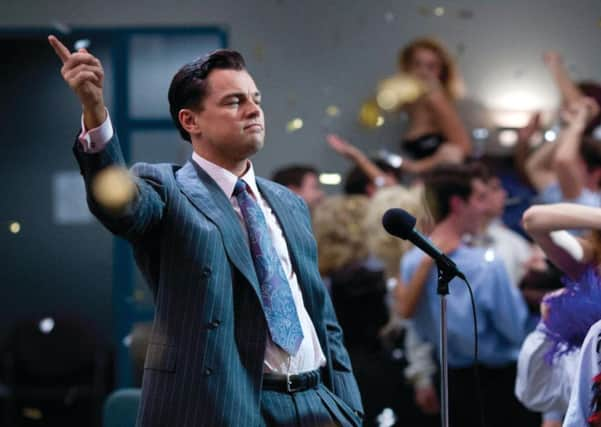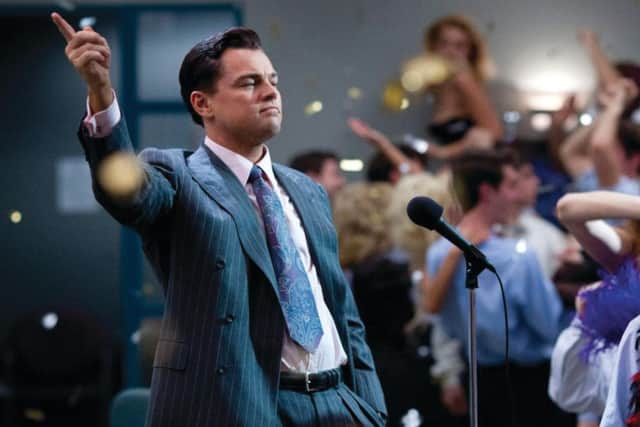Film review: The Wolf Of Wall Street (18)


THE WOLF OF WALL STREET (18)
Directed by: Martin Scorsese
Starring: Leonardo DiCaprio, Jonah Hill, Margot Robbie, Joanna Lumley, Kyle Chandler


Star rating: * *
Martin Scorsese’s fifth collaboration with Leonardo DiCaprio is an excess-all-areas account of the rise and (partial) fall of Jordan Belfort, a loathsome, money-hungry stockbroker who actively scammed gullible Americans out of hundreds of millions of dollars and spent the proceeds living the high life (not to mention a high life; he consumed barbiturates and blow the way most people consume oxygen) with the sort of unapologetic and sickening zeal that takes pathological dedication to pull off. A cautionary tale only in as much as it acknowledges how such an adherence to the free-market principle of self-determination occasionally has to be corrected when executed with such bacchanalian fervour, it’s a story rife with satiric possibilities, most of which Scorsese seems uninterested in pursuing. Instead he gets high on his own supply, delivering an orgiastic cinematic spectacle that gorges on every dwarf-tossing, hooker-banging, Quaalude-quaffing detail with such exuberance that any ironic distance between the subject matter and the way it has been presented evaporates.
Advertisement
Hide AdOf course, there’s a valid argument to be made for taking a non-judgmental approach in order to accurately reflect the vacuous and vulgar reality of this kind of plutocratic world – even more so once you consider that the moralistic tone of Oliver Stone’s Wall Street didn’t exactly prevent Belfort’s generation from embracing Gordon Gekko’s “greed is good” mantra in the post-crash 1990s. But The Wolf of Wall Street’s commitment to cataloguing Belfort’s reprehensible behaviour (taken from Belfort’s memoir of the same name) proves more exhausting than exhaustive. Too often the film’s technique of glorifying the chaos to shine a light on it belabours a point that could have been made in two-thirds of its three-hour running time.
Indeed, it’s telling that the film works best in its first hour as Scorsese details Belfort’s rise as a trader. Mentored in the chest-beating, self-aggrandising and self-medicating nature of the business by a martini-and-cocaine consuming fund manager (an amusing cameo from Matthew McConaughey), Belfort begins his first day as a licensed broker on Black Monday, a portentous start, not least because in losing his job before he’s really had a chance to do any work, his eyes are opened up to the nobody-knows-anything realities of such a volatile business.
Retreating to a suburban “boiler room” where worthless “penny stocks” in going-nowhere start-ups are pumped-and-dumped on blue-collar workers too intimidated to invest in legitimate blue-chip companies, Belfort doesn’t spend long licking his wounds. Using his spectacular abilities as a salesman, he rises fast, starting his own legit-sounding brokerage firm and staffing it with a team of similarly motivated street-smart self-starters.
Like a willfully vulgar flipside to The Great Gatsby, the film offers an interesting meditation on class in these early stages, with Belfort pursuing wealth not to escape from his relatively humble origins (he grew up in a family of accountants in Queens), but to ram his uncouth roots in the faces of the moneyed elite that looks down on him and his crew as they start making a name for themselves on Wall Street. It’s a connection reinforced by DiCaprio’s performance; the way he contorts his body and voice – screwing up his face and raising his vowels, huffing and puffing Belfort up as he callously fleeces the poor so that he can bare his fangs amongst the rich – feels like a distorted parody of his titular turn in last year’s lavish, big screen take on F Scott Fitzgerald’s American Dream-skewering classic.
Alas, once the drugs and women and the money start entering the fray, DiCaprio’s performance gets stuck – like the movie itself – on a cartoonish groove. Save for one extended sequence late on that reconfirms the actor’s technical brilliance (it involves mimicking the effect of being “palsied” by some vintage Quaaludes), it becomes less and less interesting the more it tries to outrage. Never is there a sense that reality is ever impinging on anyone’s lives in the way that it did in, say, Goodfellas. Even when things start to unravel, characters resort to a sort of glib default that’s more comic book than comic. Jonah Hill’s performance as a furniture salesman who becomes Belfort’s right-hand man, for instance, is little more than a caricature – a silly accent and a set of bleached teeth. Naomi Robbie’s histrionic turn as Belfort’s second wife, meanwhile, gets lost in a rush of meaningless scenes that echo the vigour of past Scorsese classics but have none of their raw, unrelenting power.
That nothing feels truthful is perhaps unsurprising: every line of dialogue or voice-over sounds like a boast and, dispiritingly, Scorsese seems to have taken Belfort’s braggadocio at face value. For all the thematic possibilities his story offered, Belfort’s own life is not dramatically rich enough to sustain such an inflated biopic. The Wolf of Wall Street ends up feeling like a penny stock that’s been over-valued.